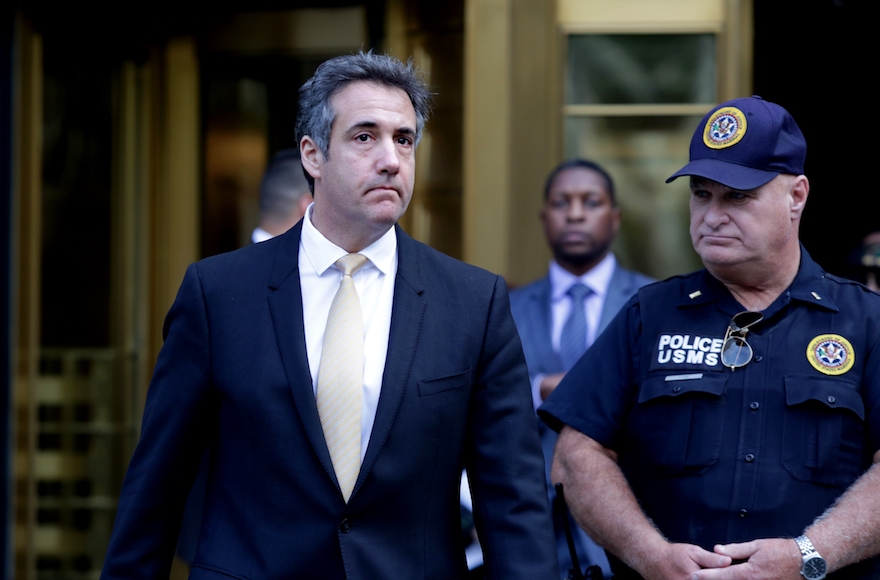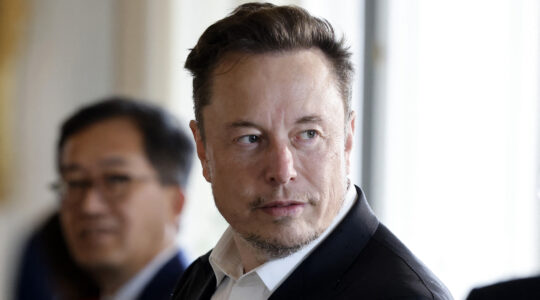WASHINGTON (JTA) — A Jew makes news, but does that make it Jewish news?
Take the case of Michael Cohen, who pleaded guilty Tuesday to fraud and campaign finance improprieties, directly implicating his former boss, President Donald Trump. Cohen, whose father survived the Holocaust, began his education at a yeshiva day school but transferred to the Lawrence Woodmere Academy. He once described himself as an “agnostic Jew.”
But little else in his story connects him to Jewish life in an interesting or newsworthy way. It’s not that he is a perceived villain; perps like Bernie Madoff demanded wide and deep coverage in the Jewish media when he cultivated Jewish business networks and philanthropic circles to fleece thousands of people and, yes, Jewish organizations.
We plumbed JTA archives for Cohen’s Jewish moments and they reinforce the impression that his faith and upbringing just don’t resonate in the story that brought him national attention: Trump’s campaign, and the scandals now besetting the presidency.
Cohen cited the Holocaust twice.
In July 2015, just after Trump launched his campaign, former Arkansas Gov. Mike Huckabee, then also vying for the Republican presidential nomination, accused President Barack Obama of leading Jews to the “doors of the oven” with the Iran nuclear deal.
That earned a rebuke from Israel’s ambassador to the United States, Ron Dermer, who vigorously worked to kill the deal, as well as from an array of Jewish organizations and from fellow Republicans. Dermer said it was “inappropriate” to liken the mass murder of Jews to policy differences.
But not from Trump. Speaking for his boss, Cohen, thought Huckabee was on target.
“I’m not offended by the words,” Cohen told CNN, noting that his father survived the Holocaust. “What I am is I’m concerned. I’m truly concerned for the safety of not just this country but the countries all around the world.”
Cohen’s father and his survival came up more recently when he explained why he was quitting the Republican National Committee, where he was vice chairman of the party’s fundraising committee.
“As the son of a Polish Holocaust survivor, the images and sounds of this family separation policy is heart-wrenching,” Cohen wrote in his resignation letter in June, referring to a policy that had been in place for months. “While I strongly support measures that will secure our porous borders, children should never be used as bargaining chips.”
Cohen didn’t mention it, but the resignation also may have been related to the launch of Cohen’s talks with prosecutors.
Cohen got mad at rabbis who were mad at Trump.
Cohen rarely addresses Jewish issues on his Twitter feed. Last year he retweeted Yom Kippur greetings from Trump and Vice President Mike Pence, and Cohen lumped Passover and Easter greetings into a single tweet in April.
An exception was ahead of Trump’s speech to the American Israel Public Affairs Committee in 2016 when he learned that a number of rabbis were planning to protest.
“Anyone who believes that @realDonaldTrump is a racist doesn’t know #Trump at all,” he said on Twitter. “Shame on the protesting rabbis with #AIPAC.”
He delayed his son’s bar mitzvah moment for Trump, who, shall we say, was not appreciative.
Cohen invited Trump to his son’s bar mitzvah in 2012, The Wall Street Journal reported in a deep dive earlier this year into the difficult Trump-Cohen bromance.
Trump ran late, and Cohen delayed the blessings ahead of the Torah readings until his boss showed. Here’s how Trump repaid the honor, per the Journal, quoting an attendee:
“After Mr. Trump arrived, he gave a speech, telling guests he hadn’t planned to come, but he relented after Mr. Cohen had repeatedly called him, his secretary and his children begging him to appear. The guests laughed because ‘everyone knew it was very realistic-sounding.'”
The marital rape thing
One of the first times that many people probably even heard Cohen’s name was in July 2015, when he insisted to the Daily Beast that Trump could not have raped his ex-wife, Ivana, as she had alleged in a divorce deposition.
“It is true: You cannot rape your spouse. And there’s very clear case law,” Cohen said.
It’s not true; all 50 states make it a crime. Cohen apologized.
OK, not quite a Jewish moment, but an opportunity to note that spousal rape has also been against Jewish law for millennia.
Maybe Cohen should have stayed in yeshiva.
JTA has documented Jewish history in real-time for over a century. Keep our journalism strong by joining us in supporting independent, award-winning reporting.






